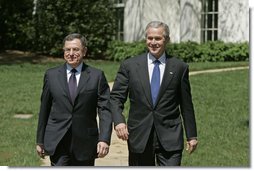Bush to Siniora: Drop Dead
Israeli war planes struck Lebanese army targets on Tuesday: “Israeli warplanes pounded an army barracks east of Beirut in an overnight raid in which 11 troops, including four officers, were killed and 40 injured, an army statement said Tuesday.”
That wasn’t a Hizbullah barracks. That was the regular Lebanese army, the one the Israelis say they would trust to patrol the Lebanese border with Israel, and which they wish would take on Hizbullah. So why are they bombing the Lebanese Army?
As for the government in charge of the army, it was pleading pretty pitiably. Lebanese Prime Minister Fouad Siniora (a Sunni Muslim businessman) pleaded for an immediate internationally-sanctioned cease-fire on Tuesday. Xinhua reports:
‘ Siniora vehemently condemned Israel’s continued aggression against the battered country, saying the international community must have been aware that Israel was committing massacres against Lebanese civilians, including children, women and elders. He said that Israel was acting to destroy “everything that allows Lebanon to stay alive”. He added that the Israeli troops continued its bombing attacks on Tuesday, targeting Lebanon’s gas stations, civilian residences, roads, army barracks and posts, food processing mills and vehicles carrying foodstuff. ‘
Siniora came to power as part of an anti-Syrian political movement supported by the Bush administration, dubbed by the American press “the Cedar Revolution.”
Here is what George W. Bush said about Siniora in April of this year:
‘ PRESIDENT BUSH: Well, we just had a really interesting discussion. I told the Prime Minister that the United States strongly supports a free and independent and sovereign Lebanon. We took great joy in seeing the Cedar Revolution. We understand that the hundreds of thousands of people who took to the street to express their desire to be free required courage, and we support the desire of the people to have a government responsive to their needs and a government that is free, truly free . . .
We talked about the great tradition of Lebanon to serve as a model of entrepreneurship and prosperity. Beirut is one of the great international cities, and I’m convinced that if Lebanon is truly free and independent and democratic, that Beirut will once again regain her place as a center of financial and culture and the arts.
There’s no question in my mind that Lebanon can serve as a great example for what is possible in the broader Middle East; that out of the tough times the country has been through will rise a state that shows that it’s possible for people of religious difference to live side-by-side in peace; to show that it’s possible for people to put aside past histories to live together in a way that the people want, which is, therefore, to be peace and hope and opportunity.
And so, Mr. Prime Minister, we’re really glad you’re here. I want to thank you for the wonderful visit we’ve had, and welcome you here to the White House.
This is the first sentence of a news item today: “George W. Bush on Tuesday warned Syria to stay out of Lebanon as he signalled to Israel that it would have more time to carry out its military campaign . . .” I swear to God, it really says that. Then comes this gem: “He said Israel had been asked to ensure that the government of Fouad Siniora survived, but the White House declined to comment on repeated Israeli strikes against Lebanese army units.”
What you have to admire most about W. is how he stands by his friends.






 © 2025 All Rights Reserved
© 2025 All Rights Reserved